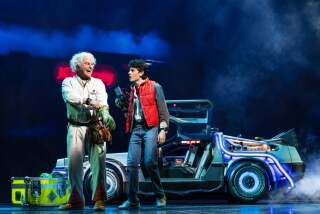Skeletons tumble out of the closet in ‘Razorback’ at Theatre Theater
A crime thriller heavily laced with violence and cruelty, John Pollono’s “Razorback” is a trendy new black comedy for a post-”Sopranos” mind-set. Fine performances in a handsomely staged premiere production from Rogue Machine show much promise in a script still in need of considerable work.
What Pollono’s play gets very right is an intriguing assortment of vivid characters, starting with the morally ambiguous Deano Goretti, an ex-mobster who’s reinvented himself as a business and family man in coastal Maine. Richard Fancy’s gruff portrayal of Deano sets the right tone as he tries to toughen up his sheltered, college-age son, DJ (Edward Tournier). “Life is hard,” Deano growls, “be harder.”
There will be ample opportunity to put this advice into practice as Deano’s dark past catches up with him. First, his estranged hoodlum son, Rocco (Jack Maxwell), shows up with his pregnant girlfriend (Melissa Paladino) and Deano’s floozy ex-wife (Laura Gardner) in tow. The three are on the lam from a transgression Rocco committed against his boss, and their intrusion is an unwelcome surprise for Deano’s current wife (Suzanne Ford), as numerous skeletons come tumbling out of the closet.
“Razorback” may be only the third production from Rogue Machine, but there’s nothing fledgling about these high-quality performances under Elina De Sabtos’ skillful direction. Structurally, however, the piece is seriously lopsided -- the first half is spent entirely on setup, with relatively little at stake. Pollono holds tension and edgy menace -- his trump cards -- in reserve until the second-act appearance of vengeance-minded Leftie (Ron Bottitta) and his muscle (Patrick Flanagan). Bottitta’s Leftie is far and away the play’s most complex and intriguing character, a brutal psychopath who savors the existential implications of his actions. Get him onstage sooner!
Just as seriously, behavior is frequently stretched beyond the bounds of believability to serve plot twists. Pollono is clearly aiming for Quentin Tarantino territory, but his dialogue lacks the latter’s crisp, luminous economy of expression.
--
Philip Brandes
“Razorback,” Theatre Theater, 5041 Pico Blvd., Los Angeles. 8 p.m. Thursdays through Saturdays, 7 p.m. Sundays. Ends Nov. 2. $25. (323) 960-7726. Running time: 2 hour, 15 minutes.
Short works by Neil LaBute
Jolts of caustic brilliance and nascent tenderness vie with trademark manipulation in “The Way We Get By” at Gardner Stage 3. In its West Coast premiere, this well-acted program of one-act plays by Neil LaBute upholds his reputation for sour-tinged realism.
All six direct-address works are variations on the themes of games and the price paid for playing them. As in “Stand Up,” in which Ben Kenber convincingly portrays an office dweeb at open-mike night. His lame comedy chops give way to a startling confession, followed by a rug-pulling hairpin turn.
Perhaps the high point is “Coax,” a Pirandello-esque exercise in perverse calculation. As blind date Walter A. Lutz Jr. muses on the gap between drama and reality, he grows creepier with each grin. Simone Sullivan is quietly effective as potential serial killer’s prey, while Lutz keeps us unsure up to a climactic twist that throws culpability back in our laps.
Another standout, “Land of the Dead,” begins as domestic abortion duologue and ends in 9/11 territory. Either topic really merits fuller examination, but Scott Brady’s vintage chauvinist and Heather Ann Smith’s affecting enabler are impressively emotive.
“Love at Twenty,” where collegiate home-wrecker Rebecca J. Hansen shares her detached itinerary, doesn’t build its premise, with Hansen competent yet slightly on-the-nose. “Persuasion Paper,” a post-feminist rant, is a scabrous goof, though Claire Meehan, who designed the resourceful set, dithers agreeably.
“I Love This Game,” a shaggy-dog allegory, is at once shameless and heartfelt, and Little League dad David Jay Barry exudes as much sensitivity as bombast.
Though director Maninder Saini’s thoughtful staging cleverly links each play, it’s a tad showcase-rudimentary at times, and LaBute remains an acquired taste. Nonetheless, devotees should find it fascinating.
--
David C. Nichols
“The Way We Get By,” Gardner Stage 3, 1501 N. Gardner St., Hollywood. 8 p.m. Fridays and Saturdays. Ends Nov. 1. $15. (818) 685-9939. Running time: 1 hour, 25 minutes.
‘Elephant Man’ misses the mark
The duality of base matter and lofty spirit inherent in the life of tragically deformed John Merrick makes “The Elephant Man” a natural fit for the faith-based theatrical mission of Hollywood’s Actors Co-op.
Loosely based on the historical figures of Merrick (whose real first name was Joseph) and Frederick Treves, the physician who befriended him and chronicled his story, Bernard Pomerance’s 1979 drama poses basic questions about the nature of being human. In depicting Merrick’s shifting fortunes from freak show attraction to celebrated member of Victorian society, Stephen Rothman’s polished, understated staging frames philosophical issues with admirable clarity.
Taking a different tack from the contemporaneous David Lynch film adaptation of the same source material, the stage version suggests Merrick’s condition without makeup or prosthetics. Actor Ronnie Steadman impressively handles the demanding physical requirements of the title role -- limbs contorted, shoulder hunched, mouth frozen in asymmetrical gape -- at the same time evoking the gentle, thoughtful man whose soul was so at odds with his own misshapen body.
As Dr. Treves, Bill Mendieta brings eloquence and passion to narration drawn heavily from Treves’ own writing. Maria Lee is also notable as the well-connected actress Treves hires to provide human interaction with Merrick.
Some uneven supporting performances are distracting at times, but the more serious limitation here is an overly polite reserve between the lead characters that blunts the emotional connection between them. Taking the Victorian-era setting and Pomerance’s refined dialogue a bit too much to heart, the production rarely manifests the chaotic challenge to the status quo that Merrick represents -- instead, it often seems to ignore the, um, elephant in the room.
--
Philip Brandes
“The Elephant Man,” Actors Co-op Crossley Theatre, 1760 N. Gower St., Hollywood. 8 p.m. Fridays, Saturdays, 2:30 p.m. Sundays. Ends Nov. 2. $30. (323) 462-8460. Running time: 2 hours, 10 minutes.
‘Fatboy’ succeeds as sheer satire
“Fatboy” commences with a barked expletive -- an “m” word not uttered in polite company. It’s a fitting opening for John Clancy’s playful take on Alfred Jarry’s “Ubu Roi,” which also opens with a verboten French “m” word of a more scatological variety.
Legendarily, that single opening word of “Ubu Roi” so shocked playgoers at its 1896 Paris premiere that they erupted in screaming riot. The opening night patrons at Clancy’s play, now in its West Coast nod at the Imagined Life Theater (formerly 2100 Square Feet), merely guffawed appreciatively during a blue streak of crudity that would make Lenny Bruce flip in his grave.
So how does a wannabe subversive shock a modern audience inured to obscenity in everything from cable to conversation? And in an era when few idols are left untarnished, what role does iconoclasm still play in the theater?
In Clancy’s attempted send-up of gluttonous American imperialism, that remains an open question. Yet Clancy delivers his message with a refreshing lack of pretension that sets him apart from the typically self-righteous agitprop crowd. Although philosophically obtuse, “Fatboy” succeeds as sheer satire.
Clancy’s eponymous hero Fatboy (née Ubu), played by the amply padded Alexander Wells, is a deceptively comical cartoon. Punch to his shrewish Judy of a wife (Rebecca Jordan), Fatboy demands pancakes. When they are not forthcoming, he devours chairs -- courtesy of prop designer Renee Peffer’s marshmallow inserts.
Don’t let the gaudy trappings of Mark Mendelson’s sideshow set and Vandy Scoates’ vaudevillian costumes fool you. It’s no accident that Fatboy’s name is an amalgam of the bombs that fell on Hiroshima and Nagasaki.
Paradoxically, on-stage anarchy requires dictatorial direction and pinpoint pacing to come to a point. Director Ian Forester is bracingly cheeky, as is his engaging cast. However, his staging lacks a certain rigor. Particularly problematic were Wells’ opening night line lapses, a critical failing that, hopefully, will be redressed during the run.
--
F. Kathleen Foley
“Fatboy,” the Imagined Life Theater, 5615 San Vicente Blvd., Los Angeles. 8 p.m. Fridays and Saturdays, 5 p.m. Sundays. Ends Oct. 26. $17. (800) 838-3006. www.needtheater.org. Running time: 1 hour, 20 minutes.
More to Read
The biggest entertainment stories
Get our big stories about Hollywood, film, television, music, arts, culture and more right in your inbox as soon as they publish.
You may occasionally receive promotional content from the Los Angeles Times.






